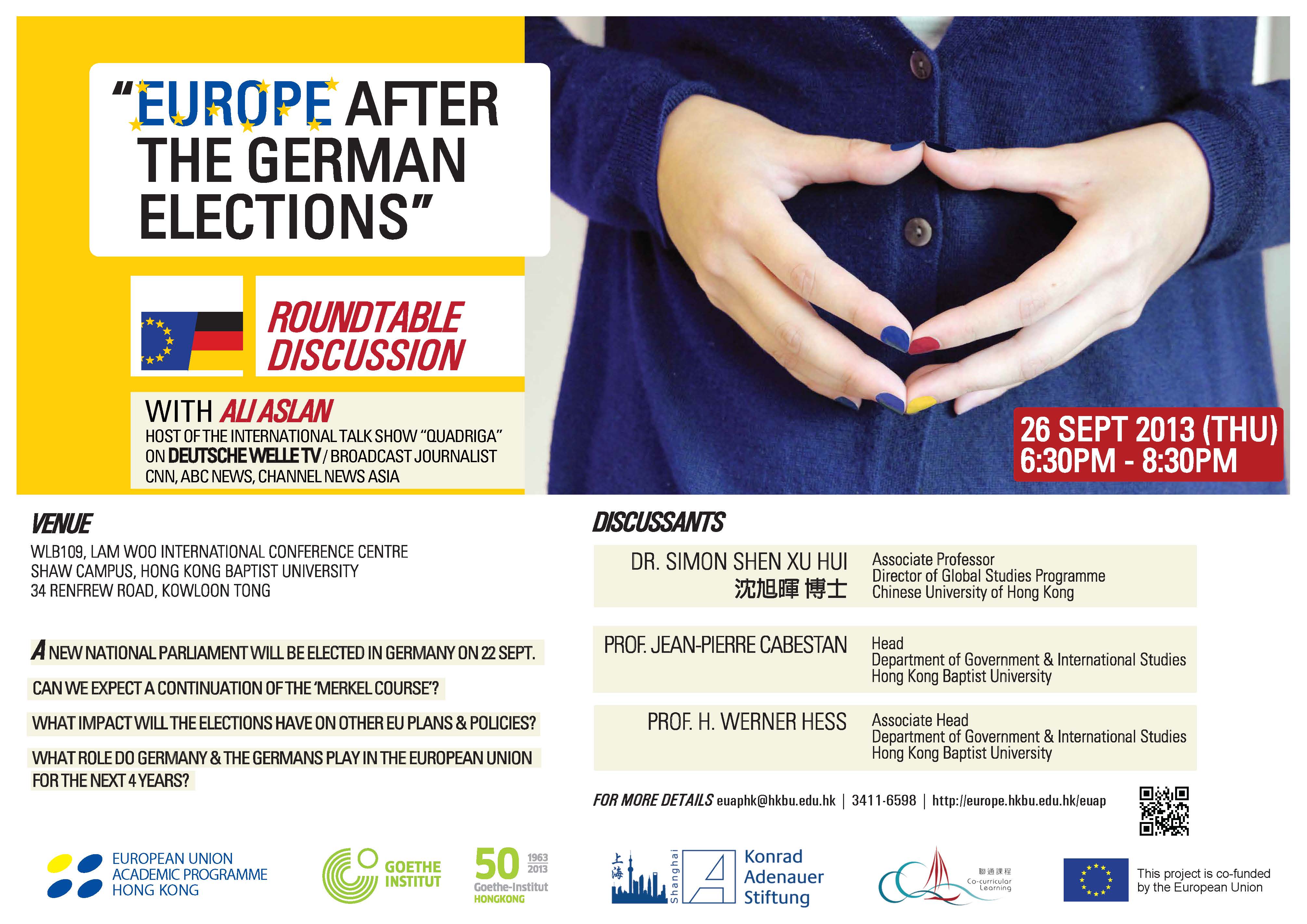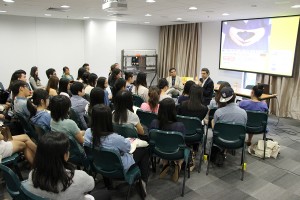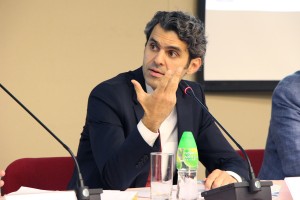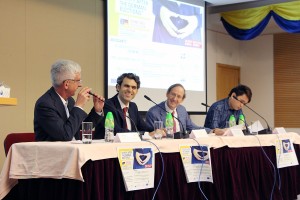Date/Time
Date(s): 26/09/2013
Time: 6:30 pm - 8:30 pm
Location
WLB109, Lam Woo INternational Conference Centre, Shaw Campus
Language: English
Admission:
“Europe after the German Elections” Round table Discussion with Ali Aslan
Discussants:
- Ali Aslan, Host of the international talk show
”Quadriga” on Deutsche Welle TV - Dr. Simon Shen Xu Hui 沈旭暉 博士
Associate Professor Director of Global Studies Programme Chinese University of Hong Kong - Prof. Jean-Pierre Cabestan
Head of Department of GIS, HKBU
/ Director General of EUAP - Prof. H. Werner Hess
Associate Head of Department of GIS, HKBU
/ Deputy Director of EUAP
Poster in German / Poster in English / Press Release / Summary
Over 130 guests came to the round table debate just four days after the incumbent German Chancellor Angela Merkel had won a majority in the elections (but narrowly failed to achieve an absolute majority in the German parliament). Another 40 students from EUAP universities attended a separate German-language discussion forum earlier on the same day. On both occasions, the EUAP hosted Mr Ali Aslan, a renowned international TV journalist, correspondent and presenter, now with Deutsche Welle TV (international channel). Mr Aslan had also worked as policy and media adviser to a previous German coalition government (2005-09).
Mr. Aslan opened the evening debate with a candid assessment of the possible impact of the elections on Europe as a whole. Germany (so Mr Aslan) has so far been shielded from economic trouble by earlier labor and tax reforms, which other European countries currently in crisis still struggled to implement. The underlying problems – such as an increasingly ageing society, financing social security systems, youth unemployment and, simultaneously, a shortage of qualified labor, the lack of a clear-sighted immigration policy, as well as sustainable growth and the ‘energy turn’ towards renewable energy sources– are similar across Europe and so far have not been addressed properly. Mr Aslan predicted the onset of an ‘era Merkel’, in which the old and new German Chancellor would have to commit herself even more firmly to all-European problem solutions. Germany’s attitude towards Europe would not essentially change; the country’s ‘destiny’ remains firmly tied to the European Union. But this will probably now entail a greater willingness to compromise with other Euro-zone members and acceptance of a larger share of collective responsibility.
In the following lively debate with Prof. Jean-Pierre Cabestan (HKBU), Dr. Simon Shen (CUHK) and Prof. Hess (HKBU) the sincerity of the German government was at times questioned, torn as it is between a principled commitment to a strengthened ‘Europe’ but an increasingly ‘Eurosceptic’ German electorate, and resulting in a de facto weakening of the EU and an increase in the number of agreements between (varying numbers of) member states only. But the discussants also noted signs that Germany’s insistence on harsh ‘austerity’ policies – the source of much dissatisfaction in neighbouring countries – would probably soften. Germany would have no alternative to becoming even more Europe-friendly than in the past, despite anxieties about the ‘high price’ tag attached to it. At the same time, expectations of a greater German role in regional foreign and security policy will certainly be disappointed; no German government would commit itself to (for example) military involvements in Syria or other trouble spots. Neither would a future German government consider changes in relations with China. Economic ties between China, the EU and Germany are by now so significant that cooperation will certainly be intensified even further. It is unlikely that justified public concerns over Chinese human rights violations will disturb this trend (and even though this clearly exposes Germany to occasional criticism of a hypocritical stance in international relations).
In conclusion, the debaters agreed that Germany and its partners in the EU and the Eurozone should not endanger the great unification achievements already made. That would also entail a bigger effort to win back public support for the European cause than governments and ‘political elites’ have so far shown. In the words of a famous phrase coined by Chancellor Merkel herself: Europe remains ‘alternativlos’ – there is simply no alternative to Europe.
與Ali Aslan先生的圓桌論壇:「德國大選後的歐洲」
於9月26日,現任德國總理默克爾勝出國會選舉後的第四天,超過130位人士出席了由香港歐洲聯盟學術計劃(EUAP)和香港歌徳學院聯合舉辦的圓桌論壇。在圓桌論壇開始之前,40位來自EUAP合作院校的學生進行了為時一個半小時的德語討論,內容圍繞德國大選對德國本土的影響。以上兩個活動均邀請了國際知名記者兼德國之聲主持人 Ali Aslan先生進行主持。他曾擔任2005-09年度德國聯合政府的政策及媒體顧問。
Ali Aslan先生首先就德國選舉對歐洲可能產生的影響進行評估。他認為,德國受惠於早期的勞工和稅收改革,使其目前避開了大部份歐洲國家所面對的經濟困境。可是,正如其他歐洲國家一樣,德國仍然需要面對一些考驗,如人口老化、社會保障制度,青年失業、勞動力短缺、移民政策,以及可持續發展和再生能源發展等,這些問題到現時都未能妥善解決。Ali Aslan先生預測,德國總理默克爾在歐洲問題的解決方案上必須採取更堅定的態度。他認為德國對於歐洲的態度不會出現本質上的改變,因為德國的「命運」仍然牢牢地拴在歐盟上。但是,他相信總理默克爾將會需要對其他歐元區成員國和作出更大的妥協,並承擔更大部份的集體責任。
在接下來跟香港浸會大學政治及國際關係學系高敬文教授、 Werner Hess教授以及香港中文大學社會科學院副教授沈旭暉博士三位與會者的辯論中,德國政府的誠意不時受到質疑。因為德國政府正在面對的不單是「強化歐洲」的原則性承諾,還有一批懷有「歐洲懷疑論」的德國選民。事實上國與國之間的合約正不斷增加,這使歐盟的影響力比以往薄弱。同時,與會者還指出,從跡象顯示,德國一直堅持的苛刻緊縮政策引發了一些鄰國的不滿,但其態度將會軟化。他們認為,面對以上種種問題,德國只能比過去更友好地對待歐洲各國。可是,他們表示,大家對德國的外交和安全政策的期望或可能會以失望告終:德國政府將不會軍事介入如敘利亞的或其他的問題國家。另一方面,與會者認為未來的德國政府將不會改變與中國的緊密關係。相反,德國和歐盟與中國之間在經濟上只會更緊密地合作。他們相信,正受公眾關注的中國人權問題並不會擾亂這個趨勢。
總括而言,他們一致認為德國及其歐盟和歐元區的合作夥伴們不應危及在歐洲統一的路上已經取得的重大成果。德國政府應付出更多的努力,以挽回公眾對歐洲一體化進程的支持。正如總理默克爾所言:歐洲別無他選。
Visit our Facebook Album for more pictures >
ENQUIRIES
3411 5726
euaphk@hkbu.edu.hk





